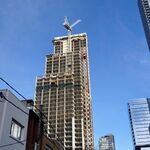The stated goal of the pilot is claimed to be clearing a path for streetcars. The longer the pilot goes on, the more I’m thinking that this isn’t true.... that purpose is confounded with the goal of transforming King to a different kind of street space.
Even if the 'go easy' approach is taken...then it invites the chaos to return (some has never left, I've been on King every other day the last few weeks and witnessed it) by denying the law abiding driver passage uninterrupted along King, while the scofflaws travel unhindered.
So at what point do you allow all to drive through unhindered again, and declare the Pilot a failure?
If any other city tried to do a "pilot" this way, they'd be laughed at. Rightly so. The problem starts with just budgeting $1.5M for this. That's a killing joke right there, and the laughter (and groans) continue thereafter.
If the City was serious about this, they'd invest in the infrastructure to make this happen, declared "pilot" or not. And that's a traffic light/red light camera/priority signal system that's need-sensitive to block vehicles from entering when congestion dictates. Not unlike traffic signals to control flow onto a highway.
Not enough available funding? ("Phhhhh") Then why didn't they ask the Feds when they came calling for a project the Feds would surely have liked for Infrastructure grants?
It's not even the number of scofflaws breaking the law as much as the City being wholly unprepared to deal with it, contrary to warning after warning.
We have to remember that in Canadian legal space, and especially in Ontario HTA enforcement, any kind of anal-retentive, by the book enforcement doesn’t fly with public opinion nor with the judiciary.
Have to disagree with that. Red Light Cameras for just a start state otherwise.
The problem isn't the court finding guilt, it's lack of budgeting for constable enforcement to issue tickets. And in the absence of persons legally enabled to issue tickets, then where's the investment in programmable and modern signalling systems?
Again, the Feds would have been more than willing to contribute to funding.
I'm reminded of the quip ascribed (falsely) to Goebbels: "Tell them a small lie, they won't believe it, tell them a big one, and they will". There's huge interest in funding subways to nowhere, at the cost of $Bs, but only $1.5M to fund a pilot that moves multiples more people than the SSE would? And have it up and running in a year or two?
Toronto...




